Enhanced TDS
Knowde-enriched technical product data sheet
Identification & Functionality
- Additives Included
- Chemical Family
- Polymer Name
- Plastics & Elastomers Functions
- Technologies
- Product Families
Features & Benefits
- Labeling Claims
- Materials Features
Applications & Uses
- Markets
- Applications
- Plastics & Elastomers Processing Methods
Properties
- Mechanical Properties
Value Units Test Method / Conditions Tensile Modulus 3300 / 1000 MPa ISO 527-1/-2 Tensile Modulus (120°C) 800 / - MPa ISO 527-1/-2 Tensile Modulus (160°C) 650 / * MPa ISO 527-1/-2 Tensile Modulus (180°C) 600 / * MPa ISO 527-1/-2 Tensile Modulus (200°C) 500 / * MPa ISO 527-1/-2 Yield Stress 100 / 55 MPa ISO 527-1/-2 Yield Stress (at 120°C) 50 / * MPa ISO 527-1/-2 Yield Stress (at 160°C) 40 / * MPa ISO 527-1/-2 Yield Stress (at 180°C) 35 / * MPa ISO 527-1/-2 Yield Stress (at 200°C) 30 / * MPa ISO 527-1/-2 Yield Strain 10 / 20 % ISO 527-1/-2 Nominal Strain at Break 40 / >50 % ISO 527-1/-2 Nominal Strain at Break (at 120°C) >50 / * % ISO 527-1/-2 Nominal Strain at Break (at 160°C) >50 / * % ISO 527-1/-2 Nominal Strain at Break (at 180°C) >50 / * % ISO 527-1/-2 Nominal Strain at Break (at 200°C) >50 / * % ISO 527-1/-2 Flexural Modulus 3000 / 900 MPa ISO 178 Flexural Modulus (at 120°C) 800 / * MPa ISO 178 Flexural Modulus (at 160°C) 600 / * MPa ISO 178 Flexural Strength 150 / 50 MPa ISO 178 Flexural Strength (at 120°C) 50 / * MPa ISO 178 Flexural Strength (at 160°C) 40 / * MPa ISO 178 Charpy Impact Strength (at +23°C) N / N kJ/m² ISO 179/1eU Charpy Impact Strength (at -30°C) N / N kJ/m² ISO 179/1eU Charpy Notched Impact Strength (at +23°C) 10 / 35 kJ/m² ISO 179/1eA Charpy Notched Impact Strength (at -30°C) 4 / 4 kJ/m² ISO 179/1eA Izod Notched Impact Strength (at +23°C) 10 / 35 kJ/m² ISO 180/1A Izod Notched Impact Strength (at -40°C) 4 / 4 kJ/m² ISO 180/1A - Thermal Properties
Value Units Test Method / Conditions Melting Temperature (10°C/min) 295 / * °C ISO 11357-1/-3 Glass Transition Temperature (at 10°C/min) 75 / * °C ISO 11357-1/-2 Temperature of Deflection Under Load (1.80 MPa) 190 / * °C ISO 75-1/-2 Temperature of Deflection Under Load (0.45 MPa) 280 / * °C ISO 75-1/-2 Vicat Softening Temperature (50°C/h 50N) 290 / * °C ISO 306 Coefficient of Linear Thermal Expansion (parallel) 0.85 / * E-4/°C ISO 11359-1/-2 Coefficient of Linear Thermal Expansion (normal) 1.1 / * E-4/°C ISO 11359-1/-2 Oxygen Index 27 / * % ISO 4589-1/-2 Glow Wire Flammability Index (at thickness 3 / - mm) 650 / - °C IEC 60695-2-12 Glow Wire Flammability Index (at thickness 0.75 / - mm) 750 / - °C IEC 60695-2-12 Glow Wire Ignition Temperature (at thickness 3 / - mm) 700 / - °C IEC 60695-2-13 Glow Wire Ignition Temperature (at thickness 0.75 / - mm) 725 / - °C IEC 60695-2-13 Thermal Index (2500 hrs) 163 / * °C IEC 60216/ISO 527-1/-2 Thermal Index (5000 hrs) 152 / * °C IEC 60216/ISO 527-1/-2 Thermal Index (10000 hrs) 141 / * °C IEC 60216/ISO 527-1/-2 Thermal Index (20000 hrs) 130 / * °C IEC 60216/ISO 527-1/-2 - Electrical Properties
Value Units Test Method / Conditions Relative Permittivity (100Hz) 3.9 / 22 - IEC 62631-2-1 Relative Permittivity (1 MHz) 3.6 / 4.5 - IEC 62631-2-1 Dissipation Factor (100 Hz) 70 / 8700 E-4 IEC 62631-2-1 Dissipation Factor (1 MHz) 260 / 1200 E-4 IEC 62631-2-1 Volume Resistivity 1E13 / 1E7 Ohm*m IEC 62631-3-1 Surface Resistivity - / 1E13 Ohm IEC 62631-3-2 Electric Strength 25 / 15 kV/mm IEC 60243-1 Comparative Tracking Index 400 / - V IEC 60112 - Material Specific Properties
Value Units Test Method / Conditions Viscosity Number 185 / * cm³/g ISO 307, 1157, 1628 - Rheological Calculation Properties
Value Units Test Method / Conditions Density of Melt 990 / * kg/m³ - Thermal Conductivity of Melt 0.25 / * W/(m K) - Specific Heat Capacity Melt 2670 / * J/(kg K) - - Other Properties
Value Units Test Method / Conditions Water Absorption 13.5 / * % Sim. to ISO 62 Water Absorption in Water (at 23°C after 24h) 3.8 / * % ISO 62 Humidity Absorption 3.7 / * % Sim. to ISO 62 Density 1180 / - kg/m³ ISO 1183 - Rheological Properties
Value Units Test Method / Conditions Molding Shrinkage (parallel) 2 / * % Sim. to ISO 294-4 Molding Shrinkage (normal) 2 / * % Sim. to ISO 294-4 Spiral Flow Length 1.0 mm 800 bar 110 / * mm - Spiral Flow Length 1.0 mm 900 bar 120 / * mm - Spiral Flow Length 1.0 mm 1000 bar 130 / * mm - Spiral Flow Length 0.5mm 1200 bar 60 / * mm - Spiral Flow Length 0.5 mm 1600 bar 70 / * mm - Spiral Flow Length 0.5mm 2000 bar 90 / * mm - - Grade Coding for Injection Molding
Stanyl® PA46 non reinforced and flame retardant injection molding grades.
Regulatory & Compliance
- Certifications & Compliance
Technical Details & Test Data
- Dynamic Shear Modulus (G)-Temperature (dry)
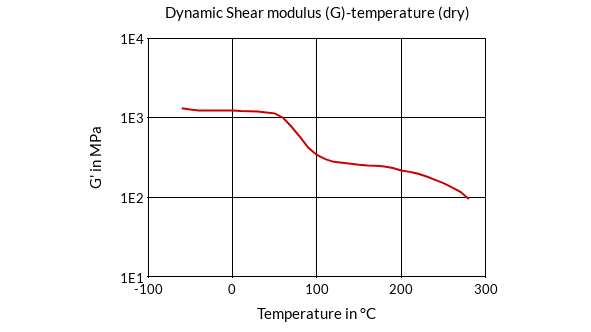
- Machinery for Injection Molding
Stanyl® grades can be processed on general injection molding machines.
Screw Geometry- Typically 3-zone screw designs with volumetric compression ratios of approximately 2.5 work fine.
Steel Type
- Abrasive & corrosion resistant tool steels which are normally used for glass and/or mineral reinforced, flame retardant materials are also to be used for Stanyl® polymers in tools, nozzles and screws.
Nozzle Temperature Control
- Due to the combination of the typical high melting temperature of Stanyl® and consequently its high processing temperature, it is necessary to have a good temperature control for the nozzle. The use of an open nozzle or, even better, a reversed tapered nozzle with good temperature control and an independently-controlled thermocouple nearby the tip and heater bands with sufficient output is recommended.
- The nozzle temperature should be set as high as possible to prevent a cold slug, yet low enough to prevent excessive drool.
Venting Design
- A good venting design is crucial for good molding behavior (easy filling) and low outgassing/mold deposit. Blocked vents can lead to incomplete parts and/or burning at the end of the flow path (diesel effect).
- It is recommended to use venting on all inserts (explosive venting) and also on the runner system. Use decreased injection speeds during filling in order to make the venting as effective as possible.
Hot Runner Layout
- The fast crystallization of Stanyl® asks for specific hot runner design rules. For more details, there is also a special hot runner flyer available for all Stanyl® grades. Please contact your Envalior sales or check our websites.
- Try to achieve a close contact with your hot runner supplier and Envalior as the material supplier, to ensure that the right hot runner system i is chosen.
- When processing Stanyl® with hot runners, keep in mind these basic rules:
- Central bushing heated separately
- Only use external heated system
- Manifold heated from both sides
- Tip with thermocouple in front (near gate)
- Very accurate temperature control in the gate area
- Chemical Resistance
Chemical Type Chemical Name Resistance Other Acetaldehyde (40% by mass) at 23°C resistant Other Acetamide (50% by mass) at 23°C limited resistant, tests necessary to verify Other Acetamide (50% by mass) at >140°C not resistant Other Acetic acid (10% by mass) at 100°C not resistant Other Acetic acid (10% by mass) at 23°C limited resistant, tests necessary to verify Other Acetic acid (95% by mass) at 23°C not resistant Ketones Acetone at 23°C resistant Other Acetophenone at 23°C resistant Other Acetyl chloride at 23°C not resistant Other Acetylene at 23°C resistant Other Acrylic acid at 23°C not resistant Other Aliphatic amines at 23°C resistant Other Aliphatic hydrocarbons at 23°C resistant Other Alkylbenzenes at 23°C resistant Other Allyl alcohol at 23°C limited resistant, tests necessary to verify Other Aluminum acetate (saturated) at 23°C resistant Other Aluminum chloride (10% by mass) at 23°C resistant Other Aluminum hydroxide (saturated) at 23°C resistant Other Aluminum salts of mineral acids (saturated) at 23°C limited resistant, tests necessary to verify Other Aluminum trichloride (10% by mass) at 23°C resistant Other Amino acids (saturated) at 23°C resistant Other Ammonia at 23°C limited resistant, tests necessary to verify Other Ammonium chloride (35% by mass) at 100°C limited resistant, tests necessary to verify Other Ammonium chloride (35% by mass) at 23°C resistant Other Ammonium salts of mineral acids (10% by mass) at 23°C resistant Other Ammonium salts of mineral acids (10% by mass) at 50°C limited resistant, tests necessary to verify Other Ammonium thiocyanate (saturated) at 23°C resistant Other Amyl acetate at 100°C not resistant Other Amyl acetate at 23°C resistant Other Amyl alcohol at 23°C resistant Other Aniline at 23°C limited resistant, tests necessary to verify Other Anodizing liquid (HNO3/H2SO4) at 23°C limited resistant, tests necessary to verify Other Antimony trichoride (saturated) at 23°C not resistant Other Aqua Regia (HCl/HNO3) at 23°C not resistant Other Aromatic hydrocarbons at 23°C resistant Other ASTM 3 at 23°C limited resistant, tests necessary to verify Other Bariumsalts of mineral acids at 23°C limited resistant, tests necessary to verify Other Benzaldehyde at 23°C limited resistant, tests necessary to verify Other Benzene at 23°C resistant Other Benzene at 80°C resistant Other Benzoic acid (20% by mass) at 23°C limited resistant, tests necessary to verify Other Benzoic acid (saturated) at 23°C not resistant Other Benzyl alcohol at 23°C limited resistant, tests necessary to verify Other Beverages at 23°C resistant Other Bleaching agent (NaOCl) at 23°C not resistant Other Boric acid (10% by mass) at 23°C limited resistant, tests necessary to verify Other Boron trifluoride at 23°C not resistant Other Brake fluids (DOT 3/4) at 23°C resistant Other Bromine water (saturated) at 23°C not resistant Other Bromochlorodifluoromethane at 23°C resistant Other Bromotrifluoromethane at 23°C resistant Other Butadiene at 23°C resistant Other Butane at 23°C resistant Other Butanediols at 23°C resistant Other Butanediols at >140°C limited resistant, tests necessary to verify Other Butanols at 23°C resistant Other Butene glycol at 23°C resistant Other Butene glycol at >160°C limited resistant, tests necessary to verify Other Butene-1 at 23°C resistant Other Butter at 23°C limited resistant, tests necessary to verify Other Butyl acetate at 23°C resistant Other Butyl acrylate at 23°C resistant Other Butyl glycolate at 23°C resistant Other Butyl phthalate at 23°C resistant Other Butyric acid (20% by mass) at 23°C limited resistant, tests necessary to verify Other Butyrolactone at 23°C resistant Other Butyrolactone at >90°C limited resistant, tests necessary to verify Other Calcium chloride (10% by mass) at 100°C limited resistant, tests necessary to verify Other Calcium chloride (10% by mass) at 23°C resistant Other Calcium chloride (alcoholic) (20% by mass) at 23°C limited resistant, tests necessary to verify Other Calcium chloride (saturated) at 100°C not resistant Other Calcium chloride (saturated) at 23°C resistant Other Calcium chloride (saturated) at 60°C limited resistant, tests necessary to verify Other Calcium hydroxide (saturated) at 23°C resistant Other Calcium hypochloride (saturated) at 23°C not resistant Other Camphor (alcoholic) (50% by mass) at 23°C resistant Other Caprolactam (50% by mass) at 23°C resistant Other Caprolactam (50% by mass) at >150°C limited resistant, tests necessary to verify Other Carbon disulfide at 23°C resistant Other Carbon disulfide at 60°C not resistant Other Carbon tetrachloride at 23°C resistant Other Casein at 23°C resistant Other Chloral hydrate at 23°C not resistant Other Chloramines (10% by mass) at 23°C not resistant Other Chlorinated biphenyls at 80°C limited resistant, tests necessary to verify Other Chlorine water at 23°C not resistant Other Chloroacetic acid (10% by mass) at 23°C not resistant Other Chlorobenzene at 23°C resistant Other Chlorobenzene at 50°C resistant Other Chlorobromomethane at 23°C limited resistant, tests necessary to verify Other Chlorodifluoroethane at 23°C resistant Other Chlorodifluoromethane at 23°C resistant Other Chlorofluoroethylene at 23°C resistant Other Chloroform at 23°C not resistant Other Chlorosulfonic acid (10% by mass) at 23°C not resistant Other Chromic acid (1% by mass) at 23°C limited resistant, tests necessary to verify Other Chromic acid (10% by mass) at 23°C not resistant Other Chromyl chloride at 23°C not resistant Other cis-2-butene at 23°C resistant Other Citric acid (10% by mass) at 23°C limited resistant, tests necessary to verify Other Cobalt salt (20% by mass) at 23°C limited resistant, tests necessary to verify Other Copper sulfate (10% by mass) at 23°C resistant Other Copper(II) salt (10% by mass) at 23°C limited resistant, tests necessary to verify Other Cresols at 23°C not resistant Other Cycloalcohols (incl their esters) at 23°C resistant Other Cycloalkanes at 23°C resistant Other Cycloalkanones at 23°C resistant Other Decalin at 23°C resistant Other Developer (photografic) at 23°C resistant Other Dibutyl phthalate at 23°C resistant Other Dibutyl phthalate at 60°C resistant Other Dichlorobenzene at 23°C resistant Other Dichloroethane at 23°C resistant Other Dichloroethylene at 23°C resistant Other Dichlorofluoromethane at 23°C resistant Other Dichlorotetrafluoroethane at 23°C resistant Ethers Diethyl ether at 23°C resistant Other Diethylene glycol at 23°C resistant Other Diethylene glycol at >140°C not resistant Other Difluoromethane at 23°C resistant Other Dimethyl acetamide at 23°C resistant Other Dimethyl acetamide at >150°C not resistant Other Dimethyl ether at 23°C resistant Other Dimethylamine at 23°C resistant Other Dimethylformamide at 23°C resistant Other Dimethylformamide at 90°C limited resistant, tests necessary to verify Other Dimethylsilane at 23°C resistant Other Dimethylsulfoxide at 125°C not resistant Other Dimethylsulfoxide at 23°C resistant Other Dioctyl phtalate at 23°C resistant Other Dioxan at 23°C resistant Other Dioxan at 60°C resistant Other Diphenyl ether at 80°C resistant Other Dipropyl ether at 23°C resistant Other Edible fats waxes and oils at 100°C limited resistant, tests necessary to verify Other Electroplating bath (acidic) at 23°C not resistant Other Electroplating bath (alkali) at 23°C resistant Other Ethane at 23°C resistant Alcohols Ethanol at 23°C resistant Other Ethyl Acetate at 23°C resistant Other Ethyl chloride at 23°C resistant Other Ethylene at 23°C resistant Other Ethylene carbonate at 100°C not resistant Other Ethylene carbonate at 50°C resistant Other Ethylene chlorohydrin at 23°C limited resistant, tests necessary to verify Other Ethylene glycol at 100°C not resistant Other Ethylene glycol at 23°C resistant Other Ethylene oxide at 23°C resistant Other Ethylene oxide at >80°C not resistant Other Ethylenediamine at 23°C resistant Other Fatty acids at 23°C resistant Other Fatty alcohols at 23°C resistant Other Fixer (photografic) at 23°C resistant Other Fluorinated hydrocarbons at 70°C resistant Other Fluorine at 23°C not resistant Other Formaldehyde (30% by mass) at 23°C resistant Other Formamide at 23°C resistant Other Formamide at >150°C not resistant Other Formic acid (10% by mass) at 23°C not resistant Other Formic acid (10% by mass) at 50°C not resistant Other Fruit juices at 23°C limited resistant, tests necessary to verify Other Fuel; Diesel at 85°C resistant Other Fuel; FAM 1A at 23°C resistant Other Fuel; FAM 2A at 23°C limited resistant, tests necessary to verify Other Fuel; Gasoline at 85°C limited resistant, tests necessary to verify Other Fuel; LPG at 23°C limited resistant, tests necessary to verify Other Furfural at 23°C limited resistant, tests necessary to verify Other Furfuryl alcohol at 23°C limited resistant, tests necessary to verify Other Glucose at 23°C limited resistant, tests necessary to verify Other Glycerol at 170°C limited resistant, tests necessary to verify Other Glycerol at 23°C limited resistant, tests necessary to verify Other Glycolic acid (30% by mass) at 23°C limited resistant, tests necessary to verify Other Glycols at 23°C limited resistant, tests necessary to verify Other Grease (based on ester oils) at <100°C limited resistant, tests necessary to verify Other Grease (based on metal soaps) at <100°C limited resistant, tests necessary to verify Other Grease (based on polyphenylester) at <100°C limited resistant, tests necessary to verify Other Hardening oils at 23°C resistant Other Heating oils at 23°C resistant Other Heptane at 23°C resistant Other Hexachlorobenzene at 80°C resistant Other Hexachloroethane at 23°C resistant Other Hexafluoroisopropanol at 23°C not resistant Other Hexane at 23°C resistant Other Hydraulic fluids at 100°C resistant Other Hydrobromic acid (10% by mass) at 23°C not resistant Other Hydrochloric acid (10% by mass) at 23°C not resistant Other Hydrochloric acid (20% by mass) at 23°C not resistant Other Hydrochloric acid (conc.% by mass) at 23°C not resistant Other Hydrofluoric acid (40% by mass) at 23°C not resistant Other Hydrofluoric acid (5% by mass) at 23°C not resistant Other Hydrogen at 23°C resistant Other Hydrogen peroxide (0.5% by mass) at 23°C resistant Other Hydrogen peroxide (3% by mass) at 23°C not resistant Other Hydrogen peroxide (30% by mass) at 23°C not resistant Other Hydrogen sulfide (10% by mass) at 23°C limited resistant, tests necessary to verify Other Hydroiodic acid at 23°C not resistant Other Hydroquinone (5% by mass) at 23°C not resistant Other Impregnating oils at 23°C resistant Other Ink at 23°C resistant Other Iodine (alcoholic) at 23°C not resistant Other Iron(III)chloride (acidic) (10% by mass) at 23°C not resistant Other Iron(III)chloride (neutral) (10% by mass) at 23°C limited resistant, tests necessary to verify Other Iron(III)chloride (saturated) at 23°C not resistant Other Iron(III)thiocyanate (10% by mass) at 23°C limited resistant, tests necessary to verify Other Isocyanates (aromatic) at 23°C resistant Other Isooctane at 80°C resistant Other Isopropanol at 23°C resistant Other Isopropanol at 60°C resistant Other Ketones (aliphatic) at 23°C resistant Other Lactic acid at 10°C resistant Other Lactic acid at 90°C not resistant Other Lead acetate (10% by mass) at 23°C resistant Other Linseed oil at 23°C resistant Other Lithium bromide (10% by mass) at 23°C limited resistant, tests necessary to verify Other Lithium chloride (20% by mass) at 23°C not resistant Other Lithium hydroxide (10% by mass) at 23°C resistant Other Lithium hydroxide (10% by mass) at 80°C not resistant Other Lubricating oil (gear) at <130°C resistant Other Lubricating oil (hydraulics) at <130°C resistant Other Lubricating oil (transformers) at <130°C resistant Other Magnesium hydroxide (10% by mass) at 23°C limited resistant, tests necessary to verify Other Magnesium salts (10% by mass) at 23°C resistant Other Maleic acid (25% by mass) at 23°C limited resistant, tests necessary to verify Other Maleic acid (saturated) at 23°C resistant Other Manganese salts (10% by mass) at 23°C resistant Other Mercury at 23°C resistant Other Mercury(II)chloride (saturated) at 23°C not resistant Other Methane at 23°C resistant Alcohols Methanol at 23°C limited resistant, tests necessary to verify Other Methyl acetate at 23°C resistant Other Methyl chloride at 23°C resistant Other Methyl ethyl ketone at 23°C resistant Other Methyl formate at 23°C resistant Other Methyl glycol at 23°C resistant Other Methylamine at 23°C resistant Other Methylaniline at 23°C resistant Other Methylbromide at 23°C resistant Other Methylene chloride at 23°C limited resistant, tests necessary to verify Other Methylpyrrolidone at 23°C resistant Other Milk at 23°C limited resistant, tests necessary to verify Other n-Butyl ether at 23°C resistant Other n-Butyl glycol at 23°C resistant Other Naphtha at 23°C resistant Other Naphthalene at 23°C resistant Other Naphthalenesulfonic acids at 23°C not resistant Other Naphthenic acids at 23°C resistant Other Naphthols at 23°C not resistant Other Nickel nitrate (10% by mass) at 23°C limited resistant, tests necessary to verify Other Nickel salts (10% by mass) at 23°C resistant Other Nitric acid (2% by mass) at 23°C not resistant Other Nitric acid (conc.% by mass) at 23°C not resistant Other Nitrobenzene at 23°C limited resistant, tests necessary to verify Other Nitrobenzene at >100°C not resistant Other Nitrocellulose lacquers (alcoholic) at 23°C limited resistant, tests necessary to verify Other Nitrocellulose lacquers (non-alcoholic) at 23°C resistant Other Nitrogen oxides at 23°C limited resistant, tests necessary to verify Other Nitromethane at 23°C limited resistant, tests necessary to verify Other Nitropropane at 23°C limited resistant, tests necessary to verify Other Nitrotoluene at 23°C limited resistant, tests necessary to verify Other Nitrotoluene at >100°C not resistant Other Nitrous fumes at 23°C limited resistant, tests necessary to verify Other Nitrous oxide at 23°C resistant Other Octane at 23°C resistant Other Octene at 23°C resistant Other Oil (Burmah TAF 21) at 23°C resistant Other Oil (Castrol TAF) at 23°C resistant Other Oil (Shell 10W40) at 23°C resistant Other Oil (Shell Dexron ATF) at 23°C resistant Other Oil (Shell Spirax EP90) at 23°C limited resistant, tests necessary to verify Other Oil (transformers, switchgear) at 50°C resistant Other Oils (vegatable, mineral, ethereal) at 23°C resistant Other Oleic acid at 23°C resistant Other Oleum (H2SO4+SO3) at 23°C not resistant Other Oxalic acid (10% by mass) at 23°C limited resistant, tests necessary to verify Other Oxalic acid (10% by mass) at 80°C not resistant Other Ozone at 23°C not resistant Other Paint solvents at 23°C resistant Other Palmatic acid at 80°C resistant Other Paraffin at 23°C resistant Other Pentasin CHF 11 (S) at 23°C resistant Other Pentasin CHF 7.1 at 23°C limited resistant, tests necessary to verify Other Peracetic acid at 23°C not resistant Other Petroleum at 23°C resistant Other Petroleum ether and solvents at 80°C resistant Other Phenol (alc. sol.) (70% by mass) at 23°C limited resistant, tests necessary to verify Other Phenol (conc.% by mass) at 23°C not resistant Other Phenol at >40°C not resistant Other Phenyl ether at 23°C not resistant Other Phenyl ethyl alcohol at 23°C limited resistant, tests necessary to verify Other Phenyl ethyl alcohol at >160°C not resistant Other Phosphate sol. (neutral, alkaline) (10% by mass) at 23°C resistant Other Phosphine at 23°C resistant Other Phosphoric acid (10% by mass) at 23°C not resistant Other Phosphoric acid (conc.% by mass) at 23°C not resistant Other Phthalic acid (saturated) at 23°C limited resistant, tests necessary to verify Other Polyols at 23°C resistant Other Potassium bromide (10% by mass) at 23°C limited resistant, tests necessary to verify Other Potassium chloride (10% by mass) at 23°C resistant Other Potassium chloride (10% by mass) at 70°C resistant Other Potassium dichromate (5% by mass) at 23°C limited resistant, tests necessary to verify Other Potassium hydroxide (50% by mass) at 23°C limited resistant, tests necessary to verify Other Potassium nitrate (10% by mass) at 23°C resistant Other Potassium permanganate (1% by mass) at 23°C not resistant Other Potassium thiocyanate (saturated) at 23°C not resistant Other Propane at 23°C resistant Other Propanol at 23°C resistant Other Propanol at >100°C not resistant Other Propene at 23°C resistant Other Propionic acid (5% by mass) at 23°C resistant Other Propionic acid (50% by mass) at 23°C not resistant Other Pyridine at 23°C resistant Other Pyridine at 80°C limited resistant, tests necessary to verify Other Pyrrolidone at 23°C resistant Other Pyruvic acid (10% by mass) at 23°C limited resistant, tests necessary to verify Other Rainwater (acidic) at 23°C resistant Other Refrigerator oil at 23°C resistant Other Resorcinol (alcoholic) (50% by mass) at 23°C not resistant Other Road salts at 23°C resistant Other SAE 80 at 23°C resistant Other Salicylic acid (saturated) at 23°C resistant Other Seawater at 23°C resistant Other Silane at 23°C resistant Other Silicone oils at <80°C resistant Other Silicone oils at >100°C limited resistant, tests necessary to verify Other Silver nitrate (10% by mass) at 23°C resistant Other Soap solution (10% by mass) at 80°C limited resistant, tests necessary to verify Other Sodium bromide (10% by mass) at 23°C limited resistant, tests necessary to verify Other Sodium carbonate (10% by mass) at 23°C resistant Other Sodium chlorate (10% by mass) at 23°C resistant Other Sodium chloride (10% by mass) at 23°C resistant Other Sodium chlorite (10% by mass) at 23°C limited resistant, tests necessary to verify Other Sodium cyanide (10% by mass) at 23°C resistant Other Sodium dichromate (10% by mass) at 23°C resistant Other Sodium dodecylbenzenesulfonate at 23°C resistant Other Sodium hydrogen carbonate (10% by mass) at 23°C resistant Other Sodium hydrogen sulfate (10% by mass) at 23°C resistant Other Sodium hydrogen sulfite (10% by mass) at 23°C resistant Other Sodium hydroxide (10% by mass) at 23°C limited resistant, tests necessary to verify Other Sodium hydroxide (10% by mass) at 80°C not resistant Other Sodium hydroxide (50% by mass) at 23°C not resistant Other Sodium hypochlorite (10% by mass) at 23°C not resistant Other Sodium hypophosphite (10% by mass) at 23°C resistant Other Sodium lauryl sulfate (30% by mass) at 23°C resistant Other Sodium lignosulfonate at 23°C resistant Other Sodium nitrilotriacetate (10% by mass) at 23°C resistant Other Sodium oleate at 23°C resistant Other Sodium pentachlorophenolate at 23°C resistant Other Sodium pyrosulfite (10% by mass) at 23°C resistant Other Sodium salts (nitrate, sulfate) (10% by mass) at 23°C resistant Other Soldering fluid at 23°C not resistant Other Steam at 23°C limited resistant, tests necessary to verify Other Stearate at 23°C resistant Other Stearic acid at 23°C resistant Other Styrene at 80°C resistant Other Sulfonates (10% by mass) at 23°C resistant Other Sulfur at 23°C resistant Other Sulfur dioxide (dry) at 23°C resistant Other Sulfur dioxide (moist) at 23°C limited resistant, tests necessary to verify Other Sulfur hexafluoride at 23°C resistant Other Sulfuric acid (2% by mass) at 23°C not resistant Other Sulfuric acid (conc.% by mass) at 23°C not resistant Other Sulfurous acid (saturated) at 23°C limited resistant, tests necessary to verify Other Tartaric acid (10% by mass) at 23°C resistant Other Tartaric acid (50% by mass) at 23°C limited resistant, tests necessary to verify Other Tetrachloroethylene at 23°C limited resistant, tests necessary to verify Other Tetrachloroethylene at 80°C not resistant Other Tetrachloromethane at 23°C resistant Other Tetrafluoromethane at 23°C resistant Other Tetrafluoropropanol at 23°C not resistant Other Tetrahydrofuran at 23°C resistant Other Tetralin at 23°C resistant Other Tetramethylenesulfone at 23°C resistant Other Toluene at 100°C resistant Hydrocarbons Toluene at 23°C resistant Other Transformer oil at 23°C resistant Other Trichloroacetic acid (50% by mass) at 23°C not resistant Other Trichloroacetic acid ethyl ester at 23°C - Secant Modulus-Strain (cond.)
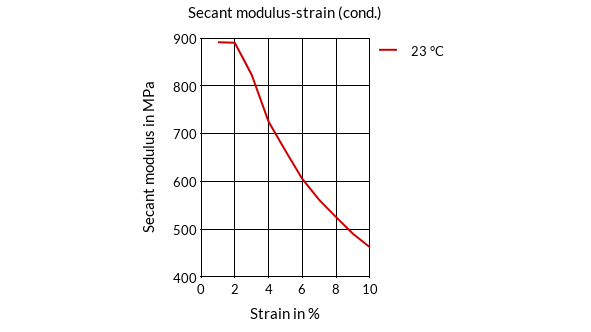
- Temperature Settings for Injection Molding
Mold Temperature
- Stanyl® can be used with a wide range of tool temperatures (80 - 120°C / 176 - 248°F). However, to achieve optimal mechanical properties and stable dimensional parts, it is recommended to apply a tooling temperature at the higher side (120°C / 248°F).
- Due to the fast crystallization speed of Stanyl®, the mold temperature has less influence on the cycle-time.
Barrel Temperature
- Optimal settings are governed by barrel size and residence time. Due to the high melting point of Stanyl® this temperature should be set high enough to provide a homogeneous melt without getting too near to the degradation temperature of 330°C / 626°F. A flat or rising temperature profile is recommended.

Mold/Tool Measured melt Nozzle Front Center Rear 80-120°C
176-248°F310-320°C
590-608°F300-320°C
572-608°F300-320°C
572-608°F300-320°C
572-608°F280-320°C
536-608°FMelt Temperature
- To generate a good and homogeneous melt, the melt temperature should always be above 310°C / 590°F. Optimal mechanical properties will be achieved at melt temperatures between 310-320°C / 590-608°F.
- We advise to frequently measure the melt temperature by pouring the melt in a Teflon cup and inserting a thermo probe into the melt.
Hot Runner Temperature
- A hot runner temperature set to the same level as the nozzle temperature should work fine and not lead to excessive overheat of the Stanyl® grade. When starting up, an increased tip temperature may be necessary to overcome a frozen nozzle.
- Secant Modulus-Strain (dry)
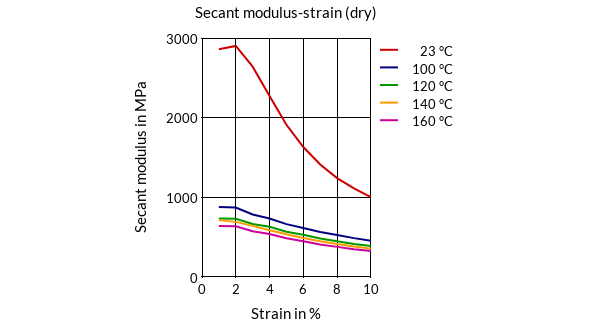
- General Processing Settings for Injection Molding
Screw Rotation Speed
- To realize a good and homogeneous melt, it is advised to set a screw rotation speed resulting in a plasticizing time that is just within the cooling time.
- The rotational speed of the screw should not exceed 6500 / D RPM (where D is the screw diameter in mm).
Back Pressure
- Back pressure should be between 20-100 bars effective. Keep it low in order to prevent nozzle-drooling, excessive shear heating and long plasticizing times.
Decompression
- In order to prevent nozzle drool after plasticizing and retracting the nozzle from the mold, a short decompression stroke can be used. However, to prevent oxidation of the melt, which may result in surface defects on the parts, it is recommended to keep this as short as possible.
Injection Speed
- Moderate to high injection speeds are required in order to prevent premature crystallization in the mold during injection phase and to obtain a better surface finish. The recommended injection speed profile goes from fast (for sprue and runner filling) to medium (for part filling) to avoid excessive shear heating and allow air to escape from the mold. Adequate mold venting is required to avoid burning at the end of the flow path (due to diesel effect).
Injection Pressure
- The real injection pressure is the result of the flowability of the material (crystallization rate, flow length, wall thickness, filling speed). The set injection pressure should be high enough to maintain the set injection speed (use set injection pressure higher than the peak pressure if possible). Tooling air vents must be effective to allow optimum filling pressure and prevent burn marks.
Holding Time
- Effective holding time is determined by part thickness and gate size. Holding time should be maintained until a constant product weight is achieved.Due to its fast solidification, holding time for Stanyl® is short compared to other engineering plastics.
Holding Pressure
- The most adequate holding pressure is the level whereby no sinkmarks or flash are visible. A too high holding pressure can lead to stresses in the part.
Cooling Time
- Actual cooling time will depend on part geometry and dimensional quality requirements as well as the tool design (gate size). Due to the fast crystallization of Stanyl®, a short cooling time is possible.
- Shearstress-Shear Rate
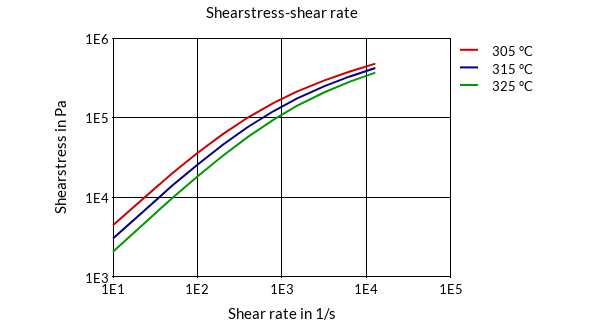
- Melt Residence Time for Injection Molding
The optimal Melt Residence Time (MRT) for Stanyl® TW341-FC is ≤ 4 minutes with preferably at least 50% of the maximal shot volume used. The MRT should not exceed 6 minutes.
A formula to estimate the MRT is described below:
𝑀𝑅𝑇 = (∏D³ρ/m) * (t/60)
Whereas:
MRT = Melt Residence Time [minutes]
D = Screw Diameter [cm]
p = Melt Density [g/cm3]
m = Shot Weight [g]
t = Cycle Time [s]
Please note: In the calculation above, the hotrunner volume has not been taken into account. When a hotrunner is part of the setup, please add the hotrunner volume to the calculation.- Startup/Shut Down/Cleaning for Injection Molding
- Production has to be started and stopped with a clean machine. Cleaning can be done with PA6-GF or PA66-GF, applicable cleaning agents or HDPE. Hot runners can also be cleaned and put out of production cleaning them with PA6-GF or PA66-GF.
- Stress-Strain (cond.)
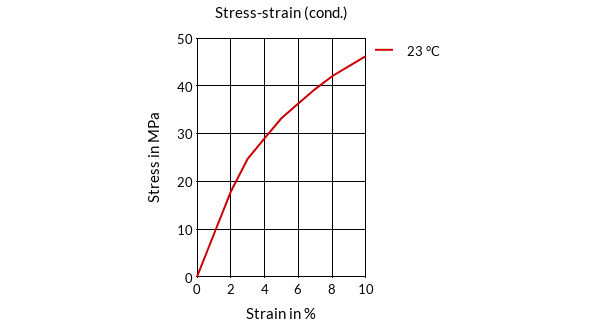
- Production Breaks for Injection Molding
- During production breaks longer than a few minutes, we advise emptying the barrel. The temperature of the barrel and the hot runner [if applicable] should be reduced to a level far enough below the melting point of the compound in order to stop decomposition of the compound.
- When the hot runner, nozzle, or even the screw is blocked, be aware that under these conditions a sudden outburst of molten material can take place. Always wear personal safety protections for hand/eye/body.
- Stress-Strain (dry)
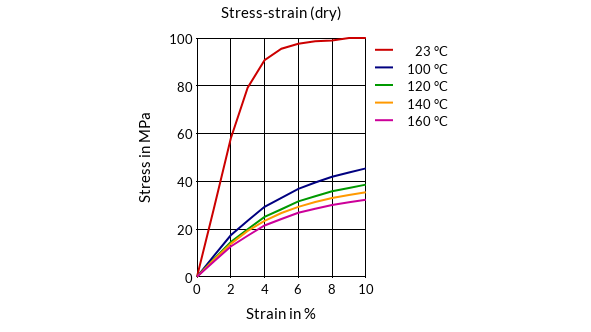
- Gas Counter Pressure for Injection Molding
The Gas Counter Pressure technology (GCP technology) is proven to contribute to achieve a better surface quality. Potential risks as gasses (blister/streak) showing at the surface of the molded part are prevented.
- Stress-Strain (isochronous) 100°C (dry)
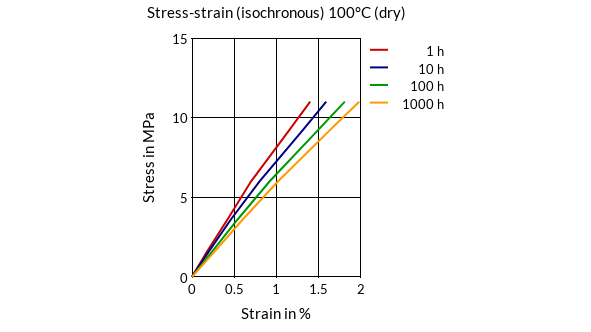
- Stress-Strain (isochronous) 140°C (dry)
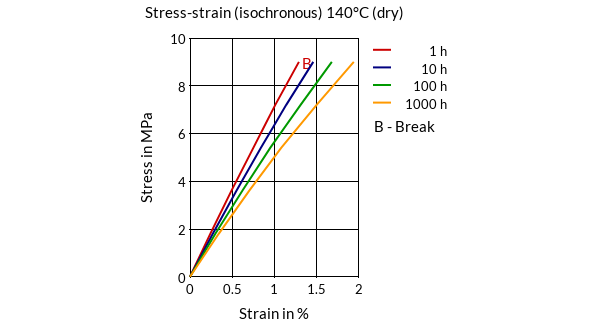
- Stress-Strain (isochronous) 160°C (dry)
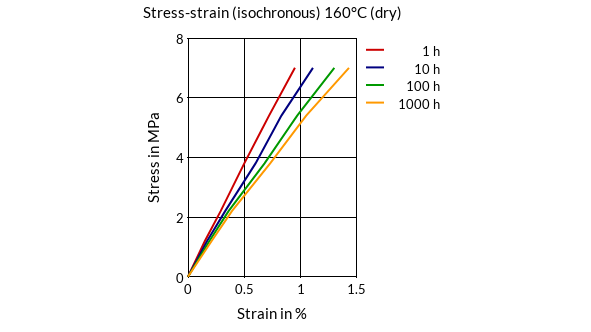
- Stress-Strain (isochronous) 23°C (dry)
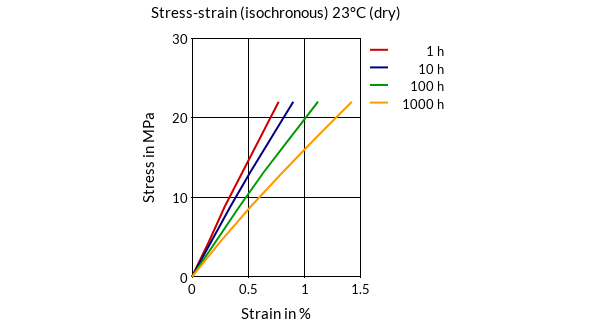
- Tensile Fatigue 8Hz, T, R=0.1 (dry)
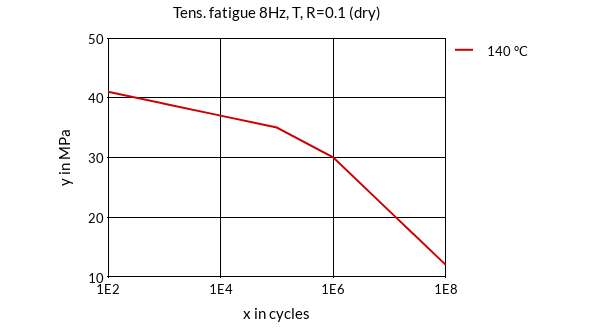
- Viscosity-Shear Rate
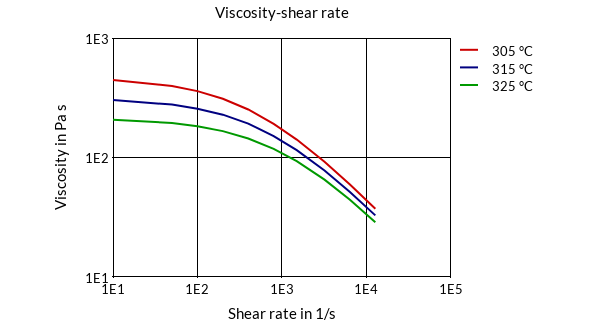
Packaging & Availability
- Packaging Type
Storage & Handling
- Material Handling for Injection Molding
Storage
- In order to prevent moisture pick up and contamination, supplied packaging should be kept closed and undamaged. For the same reason, partial bags should be sealed before re-storage. Advisable is storage at room temperature.
Packaging
- Stanyl® grades are supplied in airtight, moisture-proof packaging.
Moisture Content as Delivered
- Stanyl® TW341-FC is packaged at a moisture level ≤ 0.1 w%.
Conditioning Before Molding
- To prevent moisture condensing on granules, bring cold granules up to ambient temperature in the molding shop while keeping the packaging closed.
Moisture Content Before Molding
- Stanyl® is delivered at molding moisture specification (≤ 0.1 w%). We advise to pre-dry to overcome the fluctuation from package to package and to prevent surface-defects to a level of 0.05 w% (see drying section below). Furthermore, pre-drying is required in case the material is exposed to moisture before molding (prolonged storage or open/damaged packaging).
- Moisture content can be checked by water evaporation methods or manometric methods (ISO 15512).
Drying
- Stanyl® grades are hygroscopic and absorb moisture from the air relatively quickly. Moisture absorption is fully reversible under the following drying conditions without compromising material quality. Preferred driers are de-humidified driers with dew points maintained between -30 and -40°C / -22 and -40°F. Vacuum driers with N₂ purge can also be used. Hot air ovens or hopper driers are not suitable for pre-drying Stanyl® grades; the use of such driers may result in non-optimum performance.
Moisture content Time Temperature [%] [h] [°c] [°F] 0.1 - 0.2
and as delivered2 80 176 0.2 - 0.5 4-8 80 176 >0.5 <100
or 2480
105176
221Regrind
- Regrind can be used taking into account that this regrind must be clean/low dust content/not thermally degraded/dry, of same composition and similar particle size as the original material. The acceptable level of regrind depends on the application requirements (e.g. UL Yellow Card). Be aware that regrind can cause some small color deviations.